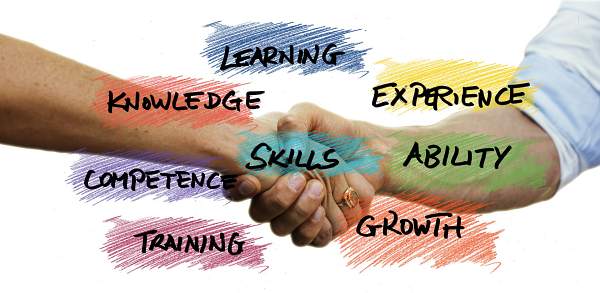Importance of Interpersonal Skills at Work
As social creatures, there are a set of skills that help us better navigate the interactions with others, and that is valid not only in our personal lives but more so at work. We work with a bunch of strangers from day 1, and develop ties with them over time, as we overcome challenges, complete projects together, and achieve big ambitious goals.
The skills that I am talking about here are Interpersonal Skills, or in short, all the skills used to interact and engage with other people. And one of the best and most basic ways to learn any interpersonal skills at work, especially non-technical skills, is to learn by doing and having the patience to practice every day.
In this article, you will learn what interpersonal skills are because they are so important in a professional environment. You will still have examples of these qualities to practice with your colleagues.
What are Interpersonal Skills?
Interpersonal Skills are a set of skills that enable a person to interact with others in a way that allows for understanding, collaboration, personal growth, and the achievement of group/individual goals. At work, key interpersonal skills are communication, negotiation, problem-solving, teamwork, and collaboration.
Importance of Interpersonal Skills at Work
Regardless of your industry, interpersonal skills are essential because a) help employees develop and foster strong working relationships among themselves and with their suppliers and customers; b) contribute to increasing staff and organization productivity and c) provide a positive working environment in general.
For several reasons, interpersonal skills at work are crucial; one refers to the ability to communicate within an organization depends heavily on people’s interpersonal skills.
These are the tools that individuals use to interact and communicate with other individuals in an organizational environment; without interpersonal skills, day-to-day business would be challenging since nearly every aspect of work involves communication.
Many jobs also involve collaboration and interaction with different people, and interpersonal skills are vital for this to happen.
What is considered good interpersonal skills (Examples)
PUNCTUALITY
A birthday party starts at 7:30, for example, and begins to receive guests from 8:00, and we see this very naturally.
Punctuality at work is a very valued feature in the corporate world, is a determining exercise in various aspects of life, synonymous with responsibility and priorities; punctuality is based on the employee’s commitment to fulfilling a task in a given period.
For example, how to be at a pre-set time, fetch goods, or still deliver something to someone.
Punctuality can be a cultural issue in countries like France, Germany, and Japan, and its absence can be interpreted as rude or disrespectful if it is not justified shortly before or after.
In countries like Brazil and Mozambique, some lightly can see punctuality if a meeting is scheduled at 9 am expected to take place at 9:30 or even 10 am.
However, it is not because the delay is cultural that it can exist in professional life and result in a lack of punctuality at work.
Why is Punctuality considered a good interpersonal Skill?
| Punctuality at work is considered an excellent interpersonal skill because it is a way to express the importance that the professional gives to their commitments and respect for all people involved with what is being done. |
For many, punctuality is much more than arriving at the agreed time and is seen as a commitment to various activities, such as delivering tasks within a given time or the fulfillment of a scheduled schedule.
For some people to arrive a “little bit” late is already part of the routine, not to mention standard. For others, the lack of punctuality is a severe problem and may even interfere with the credibility of that employee.
In the corporate world, being punctual represents the value of a professional committed to his work. Still, it has control over his own time, proving his responsibility and ability to comply with the promised.
Now you’re probably wondering, “Is being on time that important?”
It is. Every employee who seeks professional growth needs to show that he is a committed person, not only with the schedule but with projects, tasks, and everything that involves his work.
During his term as President of the United States of America, George Washington made a point of arriving on time in his commitments because he understood it as a sign of respect, arrived on time, and expected others to do so as well.
Therefore, an official who does not show to be punctual acquires various losses, not only financial with the discount on the payroll for the delay but also personal credibility.
Examples of How Lack of Punctuality Can Affect Work
| Bad impression | When you arrive late to a work meeting or job interview in the first situation, you may not seem to take the task seriously and in the other may create a wrong impression making others have more advantages and chances of getting the job than you; |
| Speech delivery may be affected. | In a presentation, you already start your speech by apologizing for the delay and acknowledging the inconvenience. This can shake the quality of your work so that you may not transmit all the information. |
TEAMWORK
Teamwork is when a group or society decides to create a collective effort to solve a problem, it can also be described as a set or group of people who dedicate themselves to carrying out a task or particular work, by obligation or not.
An excellent example of teamwork performance in sports, where athletes need each other to score goals or points, most sports are formed by teams, where each plays a role, to achieve the whole.
Corporate life depends on people, and an essential factor in a relationship between them and to have a successful and make a difference in the successful construction of the organization.
The human relationship is fundamental, as well as facilitating the coexistence between individuals increases the effectiveness in business.
When people understand the importance of carrying out their tasks as a group, they know that they can achieve results more effectively. Influencing people is achieving collaboration and cooperation; cooperation goes beyond favor, spontaneous kindness, obligation, and power of command.
Why is Teamwork considered a good interpersonal Skill?
| Teamwork is considered an excellent interpersonal skill because it enables exchanging knowledge and agility in meeting goals and shared goals. It optimizes each person’s time and still contributes to meeting other individuals and learning new tasks. |
The name teamwork or group work emerged after World War I when it became necessary to have a union of forces to rebuild war-torn countries.
According to a study published by the magazine “Proceedings of the British Royal Society,” the great responsibility for developing the human brain can be cooperation and learning acquired through teamwork.
Teamwork is not just working together; it needs sharing. Just one person never achieves the results; you need to share with the other members to reach the final goal.
| 5 Key Skills to Develop Teamwork | Description |
| Problem Management | It is essential to know how to deal with everyday disagreements in the company. In this sense, developing the ability to talk to clarify facts and reconcile needs is always the best option at this time. |
| Communication | Knowing how to value communication between you and other employees is fundamental for teamwork. Listening and speaking at the right time is also an essential skill for the environment to become pleasant and productive. |
| Proactivity | Taking action is a good thing. Always being willing to help and solve problems helps in your team’s development. |
| Innovation | Seeking to do something new or out of the box is always crucial for the company’s growth and professionals. To seek solutions and alternatives is to make everyone get to the best result with more assertiveness and what is best in a short time. |
| Trust | It is essential to develop trust among the people around you. Generating this feeling is to gain more significant space in the team because you will always support each one and know when and how to count on each collaborator. |
ABILITY TO WORK UNDER PRESSURE
Those who work with defined deadlines know that the charge is constant, regardless of the number of things that should be delivered.
It’s natural for less organized people to feel more uncomfortable with this type of situation, but that’s the secret, to be organized is fundamental to deal with these cases in the best way.
Working under pressure is, above all, to deliver what we are prepared to do and what we are asked to do on time and with quality; the context of companies is especially prone to problems and conflicts.
Let us imagine that we are responsible for a marketing campaign. Some of our collaborators get sick or can’t stand each other because we are out of the number necessary it can bring us pressure, but if we focus, we may find out of box solutions that will make us deliver the task on time yet creatively done.
3 Steps to get better at Working under Pressure
- Look inside
- Do a self-reflection and, instead of seeing problems only in others, honestly analyze what your responsibility in the scenario;
- Learn to recognize and control your own emotions and reactions to cease to be or not become part of the problem.
- Actively listen
- Listening, actively, not just letting words in one ear and out the other;
- With this listening, you can have essential insights;
- The other person may, for example, see an aspect of the problem that you did not see or give less importance than you thought to a particular bias.
- Keep calm and focused.
- Slip tasks from immediate to it can be done later;
- Working under pressure can be unfolded better when you take time to breathe during all work we got to finish.
Why is the ability to work under pressure considered a good interpersonal Skill?
| Problem-solving skills are good interpersonal skills because they allow professionals to analyze problems, identify the severity of the problem, and evaluate the impact of alternative solutions effectively and independently. |
This attribute is essential in several careers and one of the primary skills employers look for in job seekers.
Before we close, should you be interested in learning more about interpersonal skills, check out some of our articles on the topic below.
-
Diction – A Key Rhetorical Device and Staple for Speakers
Language is quite a peculiar thing, don’t you feel? We all use it every single day for one thing or the other, but we’re pretty sure few of you stop and ponder about what kind of words you use, how you use them, and whether they’re having any impact on your audience. This is where…
-
Satire & Hope: A Rhetorical Analysis Of The Great Dictator Speech
“I’m sorry but I don’t want to be an Emperor. That’s not my business” – these powerful words, uttered by Charlie Chaplin in his 1940 movie The Great Dictator, set the stage for one of the most memorable and impactful speeches in cinematic history. Delivered as а passionate plea for peace, democracy, and human dignity…
-
Analyzing the Gettysburg Address
Few speeches in American history have achieved the same level of recognition and reverence as the Gettysburg Address. In fact, if you’re from the US, you’ve definitely had to memorize this speech for school! Delivered by President Abraham Lincoln at the site of one of the bloodiest battles ever fought on American soil, this short…
-
Patrick Henry Speech Analysis
There are speeches that educate. There are speeches that inspire. And then there is the Patrick Henry speech – an explosive, passionate oration that we can consider as quite possibly the reason for the American Revolution (and the consequent adoption of the Declaration of Independence over a year later). So, it’s no wonder that this…
Conclusion
Interpersonal skills help to have more politeness in the work environment, reducing the hostility between managers and co-workers. So everyone can treat themselves more respectfully, which ends up improving the organizational climate, making the environment more peaceful.
I hope you enjoyed reading our piece on the importance of interpersonal skills. Thanks for reading!
Reference and Further Reading
AceThePresentation. 7 Indicators of Good and Bad Social Skills.
Interpersonal Skills. Investopedia.
Top 8 Interpersonal Skills For The Workplace. BigThinkEdge












